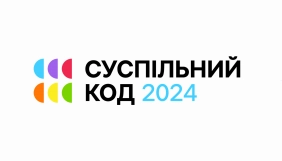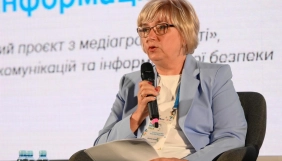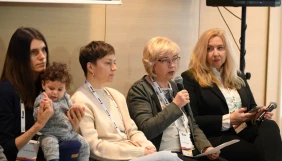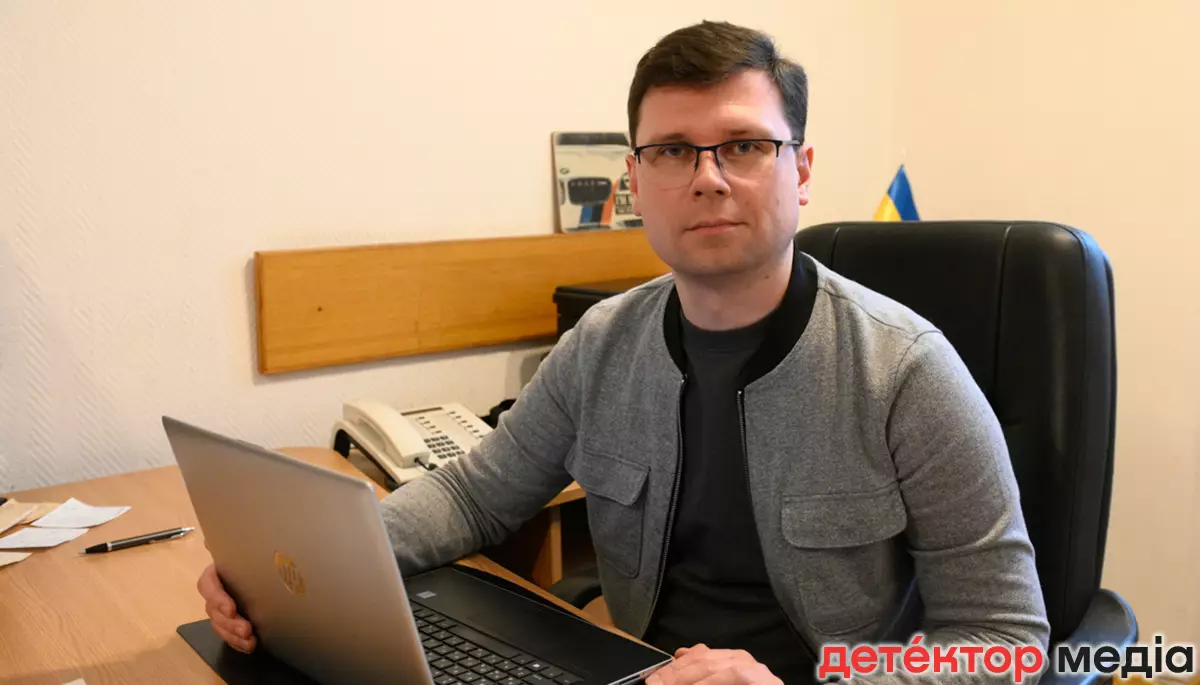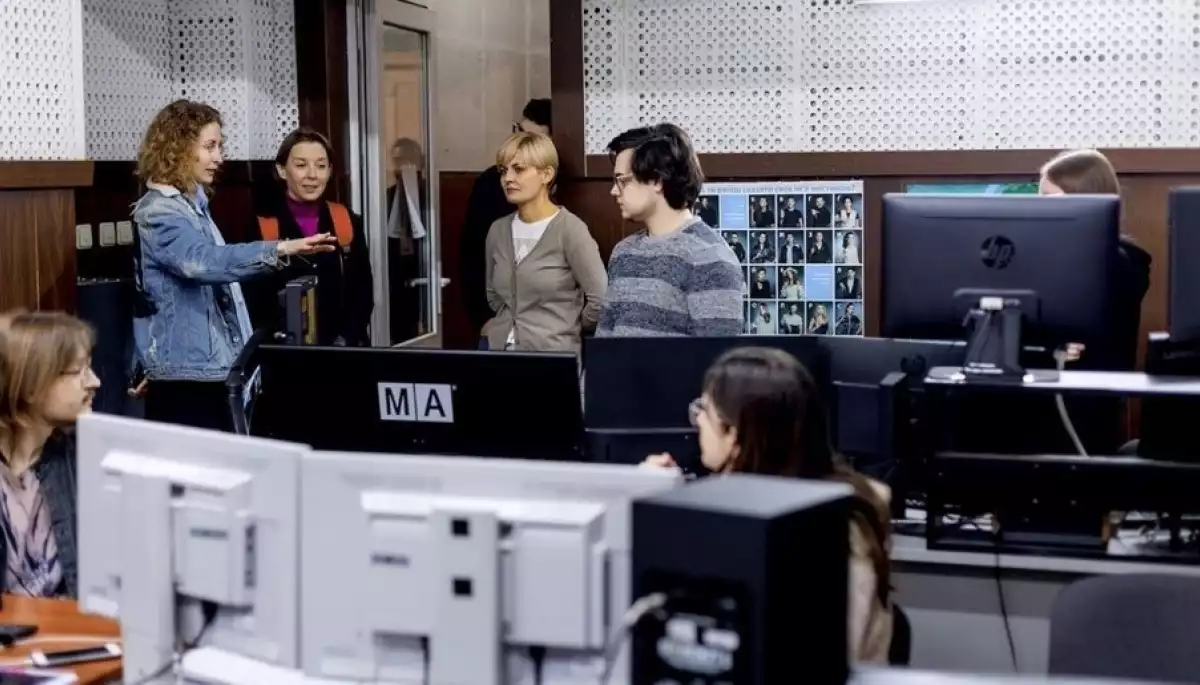
Delivering news during war…Liz Corbin's reflections on her visit to Ukraine
Виділіть її та натисніть Ctrl + Enter —
ми виправимo
Delivering news during war…Liz Corbin's reflections on her visit to Ukraine
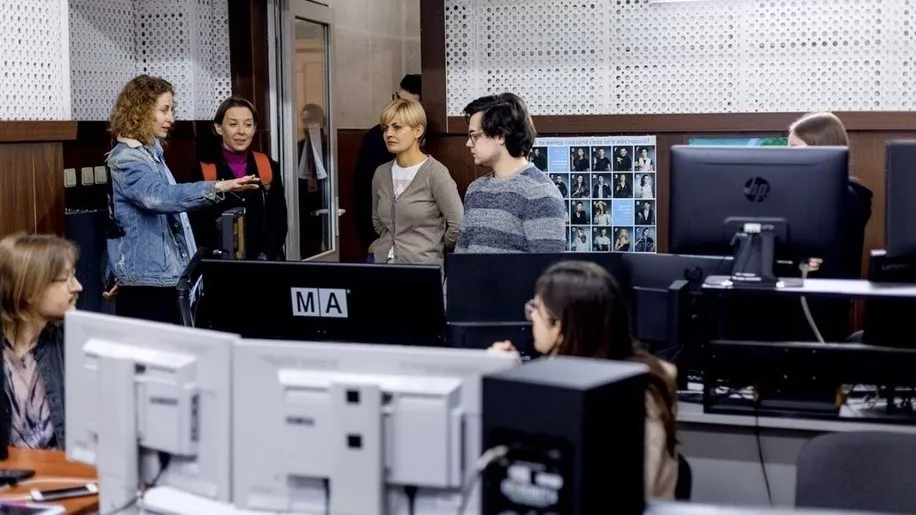

I stood at the back of the TV news gallery, like I’ve done hundreds if not thousands of times before, enjoying the last moments before broadcast. The team makes the final preparations for the programme and it’s just like any control room in any TV news operation. 15:59:00 – is the lead story there? Is the presenter ready? Sound – check, make-up – check, cameras – check. 15:59:30 calm and silence begin to descend. From London to Amman, from Brussels to Kyiv: different languages, different technology, different news; but in spirit, in the beating heart of TV news, it’s always the same. Except this time it wasn’t.
15:59:35 I’m filming on my phone; the countdown and headlines are my favourite moments. Suddenly, cutting across everything the tannoy sounds. It’s an air alert – a real threat of a Russian missile attack on the Ukrainian capital. The readiness, the expectant tension of a gallery and studio about to go to air dissolves. There is a collective sigh and a groan of disappointment. Another bulletin disrupted, another sign that nothing here is normal.
And then, the daily miracle I’d only ever heard about takes place in front of me. The staff calmly leave their positions and head for the basement. Their entire gallery, studio, playout system, radio mics and presenter talkback systems are replicated in their bunker facilities.
16:04:30 everyone is in place. Final checks are repeated. A new opening script is on autocue. A map graphic is ready to explain the breaking news and the interruption.
16:06:00 Cue presenter. We’re on air. The host explains that the air alert is across the whole country. A plane capable of firing hypersonic missiles which could reach any part of Ukraine in minutes has taken off in Belarus. The whole country. Just take that in for a moment. A country of 40 million people is told to take shelter: in a basement, or a place with two walls between them and the outside, in a metro station, wherever they can. And it happens every single day, often at night, often much more than once.
That was my first air alert in Ukraine. Despite years of training and deploying journalists to war zones, it was also my first day in a country at war. So yes, the adrenaline was pumping, but to see the Suspilne staff handle the situation with such professionalism and expertise was an honour.
It was also a “gentle” introduction to air alerts for this visitor. No missiles were fired, it was all over shortly before the bulletin came off air at 16:15:00. What was to come was quite different.
When Roman Karov, Suspilne Security Officer, picked me up from the night train early on the Monday morning in Kyiv, he said “so, we’re going to Kharkiv tomorrow?”. Yes, I replied, what do you think? “OK. But Kharkiv is not so safe”. Later, when I met Mykola Chernotytskyi, CEO at Suspilne Ukraine, he said “so, you’re going to Kharkiv?”. Yes, I replied, what do you think? “Brave!”.
Angelina Kariakina, who was Suspilne’s Head of News when the full-scale invasion happened, and my host, rolls her eyes when I tell her. It’ll be fine, we’re going to be really careful. And we were. A lot had gone into planning this trip. A full risk assessment. We were carrying flak jackets and helmets; my orange backpack was loaded with first aid and trauma kits, water, snacks, a torch, power banks, a spare phone. I could hear the jerry cans of fuel sloshing around in the back of our car. We had a driver and Roman for security. We are only travelling in daylight, overnight is too high risk. And we are meeting Slava.
"One of the strongest editors in the whole company..."
Slava Mavrychev is the head of Suspilne’s Eastern Hub. Even by Suspilne’s standards he’s a hero. His colleagues hold him in the utmost regard: “one of the strongest editors in the whole company” said one, “he’s incredible,” said his CEO.
And like all the best heroes, Slava is too busy surviving and working to know about any of this. Angelina gives him an enormous hug when we arrive. They haven’t seen each other since 2022 shortly after the Russian occupation of the outskirts of Kharkiv was pushed back to the border 30km from here. The people and journalists of Kharkiv have been through a lot already, and in the last few months the Russian attacks have been intensifying.
The city is quiet. You know that this city should be a place where everyone complains about the traffic, where the cafés should be busy, and the central square (the second largest in Europe apparently) should be a bustling heart of the city where it’s impossible to find a parking spot. But not today. On first glance there’s nothing obviously odd. But I know that building, why do I know it? I’ve never been to Kharkiv. And then I realise – it was from a dashcam video from 2022. Cars were driving past the city hall and suddenly you saw it. A missile plummeting from the sky, slamming into the right-hand corner of the building, an enormous explosion. The famous façade I’m standing in front of now, disappeared into the smoke. And the façade is all that remains. Behind it the building is destroyed. Work has started to clear it up but it’s a mammoth task and there are other priorities.
On another side of the square, a modern upmarket hotel, all blue glass and promise of a luxurious experience. Another illusion. We walk round the side to see how the missile gored the building, ripping through eight of its 11 floors. A ZDF (EBU German Member) journalist was injured here.
We were in Kharkiv for five hours. In that time there were seven air alerts. Slava is a journalist but now also an amateur military expert. It helps keep him and his colleagues alive. My phone goes off – the app yelling at me about the latest alert. He checks his Telegram groups. This one is at the border, he says, that one is further west, no need to worry. We go down to a basement café anyway and hang out until he says it’s safe.
The kids come to the Metro station for their lessons...
The next time we’re close to the Metro and we enter just as the children are arriving in buses for school. They come one day per week, the rest they do online. They come to the Metro station not to travel to school but for their lessons. Above the platforms in a former technical space, they’ve built classrooms. You have to duck for the ventilation ducts and no doubt the rumble of the trains is a bit of a distraction, but otherwise they look like classrooms anywhere. The children file in hand in hand, giggling and fidgeting, clearly delighted to be in each other’s company. They’re wrapped up against the cold and I’m struck immediately by their laughing happy faces. But not by their smiles or their innocence to this war, but by their complexion. Their pallid cheeks a strong indicator that these children spend precious little time outside. Yes, it’s been winter, but these children are living under constant Russian bombardment, and outdoor play is a luxury their parents will often consider carries too high a price.
We head for the Suspilne office. No longer in the prestigious complex under their TV tower. That became too high risk a while ago. We walk through the streets where every third building is completely wrecked. Slava suddenly breaks into a run and tells us to hurry. We dive through a door and rush down to the basement. That one went over our heads, he says. In Kharkiv, 30km from the border, you don’t have long to take cover. In fact, this wasn’t a random door, we have arrived at the office – the emergency newsroom which Slava bans the team from working in. Everyone works from home in their own area. It’s too much of a risk to have everyone working together. But this is where they can come in if they have nowhere else or nowhere safe. There are desks and power. It’s cold, probably a bit damp. The walls are bare brick and there’s a sofa. It looks and feels like a bunker from another era.
But it has good wifi. Knowing I’d be here at the same time as the EBU’s senior leadership committee (SLC) meeting was taking place in Geneva, we fire up Microsoft Teams and dial in. Slava (with Angelina’s translation) tells the SLC what it’s like to operate in Kharkiv and how he manages the risk for his team. He tells us that when there’s a strike at night, it’s him that goes to the scene with his camera – if he sends a reporter, it means there will be no reporter during the day, and he can’t afford that. When someone wants to go to a location they put the information in their team WhatsApp group, three others must “like” the message before they can go, and no one can go to the scene of a strike sooner than 30 minutes after it happened – the risk of a “double tap” where first responders are targeted is too high.
Noel Curran, EBU Director General, asks, how can we help, what do you need? “Sleep!” Slava replies. He tells us knowing they have our support is a huge comfort. They never feel alone. In fact, what Slava needs is power banks. Two days after our visit huge overnight strikes plunged the city into darkness, literally and in terms of connectivity. I’d taken him some wine and four Eurovision power banks from our stocks in Geneva – he was more excited about the latter.
When it’s safe we venture upstairs. The building IS from another era, although it was operating as a radio centre until recently. Wallpaper from the 1930s perhaps, old broadcast equipment from I don’t know when, a grand radio theatre speaks of the grandeur of decades past. Slava shows us a more comfortable office space, they recently refurbished it, only for a missile to hit the building next door which collapsed ceilings, damaged the heating system, and smashed all their new windows on 31 December 2023.
Destruction wrought by humans
It was the broken glass under my feet that served as a tiny reminder of the utter hell unleashed on Saltivka, a suburb of Kharkiv, in February 2022. All around me were the bigger reminders: 9-storey apartment buildings torn apart, bearing enormous holes caused by tank rounds, fire damage. Slava pointed to the top windows, burned out and empty; the ones where he used to play with his son and look out towards the Russian border. The boy’s mother had moved them to a safer place on 23 February 2022. The next day the Russian army rolled through, destroying everything as they passed, just as Slava had foreseen from that window.
I was standing in a children’s play area, looking at my feet. I remember doing the same when I went to the scene of Typhoon Haiyan in Tacloban in the Philippines in 2013. Sometimes, you just want to look away, to not see the terror around you. This time the destruction wasn’t wrought by nature, but by humans. But just like Tacloban, even looking at your feet doesn’t spare you – there was no piece of grass to stand which wasn’t covered in glass, covered in the debris of war. A playground where no one can play.
I thought the place was deserted. It was destroyed, it should have been deserted. But Angelina points out a light in a window – a window with new glass. Some of the apartments are still occupied. People living amongst the broken ruins of a once lively community. And as we travel further into Saltivka, Angelina marvels at how it’s been cleaned up. She was here in 2022, she said it looked like Mariupol, she thought no one would ever be back. To me, it is hard to imagine how bad it must have been for this to be such an improvement, but it’s true, there are people living, shopping, chatting, catching the bus, pushing prams carrying babies born well after February 2022. Life goes on, it must go on.
We drop Slava at a metro station. I’ve known him for five hours but saying goodbye leaves me with a deep regret. I’d asked him why he stayed – why not come out for a bit, take a break? He said he knew that if he came out, lost the adrenaline, the pace of the job, he wouldn’t be able to go back. And he didn’t want to abandon his home city, plus, who else would do his job? He finds it hard enough to recruit and retain journalists, and with all his experience it would be tough for someone else to come in fresh and keep this team safe.
We were there for five hours, during which time there were seven air alerts. On the long car journey back to Kyiv, Angelina and I talk about those who stay. In the west we know most about those who left. We think about the Suspilne journalists in Kherson who managed to operate in secret under Russian occupation – sending pictures and messages when they could, at great personal risk. Because not everyone can run away, not everyone wants to, and they must live their lives. Ukrainians are fighting for the freedom to do this, but they don’t press pause on life while praying for peace. The human capacity to keep going in the most dreadful of circumstances is constantly amazing to an outsider.
"The children are the future..."
The next day I meet someone who personifies this, who has seen the worst and the best of human nature. Father Andriy Halavin is something of a celebrity these days. The cause of his fame is the same terrible reason we have all heard of the town Bucha. He is the priest at St Andrew’s, where more than 100 of the civilian victims of a Russian massacre were buried in a mass grave in late February and March 2022. He tells me of the sheer horror, he shows me the pictures of the bodies on his phone for the things words can’t describe, “Facebook never forgets” he says ruefully.
Father Andriy has taken nearly an hour of his day to talk to me. I thank him for the many many hours he has spent with journalists over the past two years. Naturally, not everyone is so welcoming of the media at the worst moments of their lives. But from the beginning he took the approach that it was journalists who would ensure Bucha is a name which is never forgotten. Recently he met a news crew from Hiroshima. “If they can recover, there is hope for us” he reflected, “no one forgot the name Hiroshima”.
And what about now, I asked, what do you need now? “Sunday school resources” he answers instantly. The children are the future. “You can’t cope with the past without looking to the future”.
Back in Kyiv, Suspilne is also firmly focused on the future. As we approach the door to the newsroom Angelina describes it as the “portal”. We’re walking down a corridor with many doors, all the same and until she stops, puts her pass on the reader and opens one of them. And it’s like walking into another world. Opened at the end of 2021 this sparkling newsroom, custom-built for TV, radio and online journalists, is a stark contrast to the building around it. This is an EBU Member very serious about news and the future of it.
Ukraine is famous for its IT expertise – exporting the services of developers across Europe and beyond. It’s no surprise that they take their online journalism seriously, but I cannot stress enough how extraordinary it is to see a broadcaster with such limited resources achieving a successful digital transformation on this scale. I cannot help but think there are many similar broadcasters, who are not in the middle of a war, who could learn from this. A fully integrated newsroom, where no one works for just one platform and where the ambition is to reach as many of the population as possible, however they can.
Their website Suspilne.media is growing fast, now counting five million monthly unique users. They have some of the most popular Telegram accounts in Ukraine and reach nine million subscribers across all their social media accounts. They make videos for YouTube (4 million subscribers) in a variety of formats – adapting their style constantly, informed by the audience data available. Suspilne recently became members of the EBU’s digital news sharing project “A European Perspective” and are learning fast about which of their stories work for other members, and which stories their audience are interested in. Not unsurprisingly it’s news about Ukrainians living abroad which do exceptionally well.
Because of course, so many Ukrainians are not living where they want to. Some live abroad but even the ones who stayed are often IDPs (Internally Displaced People). Families separated. What struck me on this visit was how many have been displaced more than once by Russia’s aggression against Ukraine and its people. Mariya Frey is the Suspilne Board Member responsible for news. She dreams of the sea and returning to her home city Mariupol. She left the east for Kyiv when this war started in 2014. She had lived with the threat of Russia to the extent that in 2022 she had a grab bag constantly ready at the door. In the early hours of 24 February, she grabbed it, put her children in the car and drove west to Lviv. She called Angelina on the way offering to report from the roads about all the people fleeing west.
The road to Lviv
After Kyiv and Kharkiv I take the same road, to go and see Suspilne’s second centre in Lviv. I was supposed to travel by train, but that morning Russia launched 31 missiles at Kyiv, so I was delayed in the bunker of my hotel. I followed the whole thing on Telegram from the moment the air alert woke me at 3.30am. Around 4.30 the missiles were still being tracked heading west, past Kyiv, when suddenly they u-turned, heading back to the capital. Down on -2 in the car park bomb shelter I felt a couple of small rumbles. Apparently, it was noisy up top. Unlike other Ukrainian cities, Kyiv is well defended from air attacks. Around 5am the air defences shot down all 31 of those cruise (29) and ballistic (two) missiles. But still 17 people were injured as the remnants rained down on houses and apartments. One of the damaged apartments belonged to a Suspilne employee who had thankfully sheltered in a metro station – it’s not the first time and the company has had to support their staff when this happens, another level of pastoral care most broadcasters thankfully don’t have to think about.
I was only a few minutes late for the train, but nothing stops Ukrainian trains. Ukrainians are fiercely proud of how the railways have supported them through these past two years, and so they should be. They run on time to the minute, no matter what is flying around them.
The road to Lviv is straight and flat. Hour after hour of huge arable fields, black with fertile soil, ploughed and ready for planting. I can see where the world’s food comes from and why the war caused hunger and chaos in the world’s grain markets.
You know you’re reaching Lviv when the ground starts to rise. The foothills of the Carpathian mountains, where Suspilne colleagues tell me I should come for skiing next winter. As we enter the town, I see something very special up ahead. The TV tower. It’s always exciting for anyone who works in broadcasting to see the TV tower, but this one is special. I text my colleagues a picture: “Never have you seen a more important TV tower. Greetings from Lviv.”
On 25 February Mariya joined Tetyana Kyselchuk and the whole Suspilne Board to create the Lviv reserve news operation and they started broadcasting as part of Ukraine’s “news marathon”. They hastily created a new newsroom, and the master control room was upgraded, all making them capable of replacing the headquarters in Kyiv should the worst happen there. Mariya proudly shows me their facilities – including the building site at the front of the building which will soon be a modern reception and working areas to showcase their facilities here.
Soon we’re back in my favourite place, the control room and studio. They’ve received funding from all sorts of benefactors to make this possible, and the set and equipment could be found in the best resourced broadcasters of Paris or Tokyo. Mariya tells me it took them a while to work out how use it all!
Now they enjoy creating beautiful television, but she tells me a heart-warming story of the early days. Many of the presenters arrived in Lviv from across Ukraine with a grab bag, just like Mariya. They didn’t come with their wardrobes of TV presenter clothes. And so, they appealed to the viewers, could anyone lend them their traditional Ukrainian outfits for their presenters to wear? And they did – some had been in their families for generations, had been worn for weddings and special occasions, but they trusted the Suspilne presenters with their heirlooms and in doing so created a moment of hugely symbolic solidarity, not just by showing the traditional national dress on television, but showing the generosity of a country turned upside down, supporting their fellow citizens in their moment of need.
The mammoth job to digitise and protect the TV and radio archives
Protecting Ukrainian culture is also a priority for a growing team at the Suspilne centre in Lviv. Taisiia Turchyn and her team has a mammoth job to digitise and protect the TV and radio archives. We meet the team who ooze passion and motivation for this important work. Everyday they do what Taisiia calls their “exercise”. They go to the library and carry a pile of heavy film cannisters up to their area, ready for studying and archiving. She says, you never know what you’re going to find when you open them up. Many are from the Soviet era, and she shows me one which is a documentary from 1977 about a Ukrainian who had been living abroad and returned to Ukraine. Along with the film is pages of documentation. It’s the script but alongside it the notes from the Soviet censor. On the first page the censor writes: “it would be much better if instead of this talking, this person would say how much better Ukraine has become during the Soviet times”.
Down in the storeroom, shelf after shelf of films show the scale of the task. Taisiia is young, we joke whether she will finish this before she retires. And she tells me it’s a challenge, they lack the equipment for many of this media. Soviet era film needs Soviet era machines to play it on and they don’t have them. You can buy them from Russia, but they’re not going to do that. Elsewhere I see rows of boxes marked ZDF and SRG, the German and Swiss EBU Members. It’s so strange to see it. Taisiia says she doesn’t think it’s their content but possibly they made the film. But she doesn’t know because again she has nothing to play it on. We agree I will immediately help connect her to these Members’ archivists!
But the archives aren’t just about the distant past. It’s a pleasure to meet one of the team working as part of the Ukraine War Archive project, supported by the EBU. Here they’re archiving material shot just yesterday, making sure all the news footage from the war is properly recorded and searchable. This archivist is from the occupied territories in the east. I only imagine how difficult it is for her to do this work.
Later Mariya and colleagues take me for dinner. She has chosen a Crimean café deliberately. The owner has her own story of displacement, one which affected her ancestors and herself. A Crimean Tatar, her family was forcibly moved to Uzbekistan in 1944 under the orders of Stalin. Eventually they returned to Crimea when she was a child. When Russia annexed Crimea in 2014, she lived under occupation for two years before moving in 2016 to Irpin, a Kyiv suburb where in 2022 the Russian advance was stopped, and Kyiv’s freedom protected. But like Bucha, Irpin is a name now synonymous with Russian brutality. She moved on to Lviv where she opened a café called “Crimean Memories”. She dreams of one day opening “Lviv memories” in Simferopol and we’re all invited.
And I can’t conclude these reflections without mentioning the food. The delicious Borscht in Kyiv, the Crimean stuffed pancakes, the ubiquitous petrol station hotdogs feeding peckish travellers on the long roads crisscrossing the country. And to take home, a bottle of “Odesa black” – a red wine smoother than anything I’ve tasted, and a bottle of apple and cinnamon liqueur, capable of warming you on any Ukrainian winter’s evening. I share these with my friends as I tell them the stories of the people I met, their kindness and their bravery. And how, despite everything, I want to come back again to Ukraine.
It's my final night. The next day I will take an early train to Poland. I pack my grab bag one more time and put it by the door. I’m tired from the air alert the previous night and fall asleep quickly. At 2.30am the now familiar air alert sounds from my phone. I get up, slip on my shoes, grab the bag and head to the basement. Slowly I’m joined by staff, other guests, two children and their parents. It’s cold, we try to sleep on the hard chairs but in reality, people chat in whispers and scroll Telegram. I watch as Russia uses every weapon at its disposal: hypersonic, cruise and ballistic missiles, and deadly drones which have become the weapon of choice in this war. They hit every region of Ukraine, targeting the power infrastructure, plunging towns and cities into darkness. This is the night Kharkiv is hit by 15 waves of ballistic missiles – my heart breaks for Slava and his colleagues.
And it’s at this moment I feel just one of the ways this war affects everyone in Ukraine. Everyone has a relative or friend on the front lines, but at home, every night, the terror continues. Families lift their children from their beds, soothe them back to sleep in the corridor or a bath lined with duvets, or the basement. They have torches and candles, blankets, and batch-cooked meals to get them through the power cuts. And when morning comes, they take their exhausted children to school, they go to work, and they keep going. The exhaustion is part of everyday life. They are tired of this war; they are tired from fear and grief and anger and constantly disturbed nights. But they are not giving up. Suspilne staff, just like everyone else, don’t know when, how or even if this will end, but they know their job: it’s to entertain, educate and inform. It’s also to live.
Джерело:EBU



